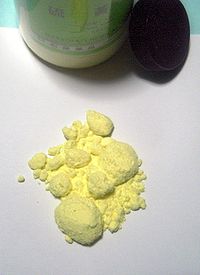- Reagent
-
A reagent is a "substance or compound that is added to a system in order to bring about a chemical reaction or is added to see if a reaction occurs."[1] Although the terms reactant and reagent are often used interchangeably, a reactant is less specifically a "substance that is consumed in the course of a chemical reaction".[1] Solvents and catalysts, although they are involved in the reaction, are usually not referred to as reactants.
In organic chemistry, reagents are compounds or mixtures, usually composed of inorganic or small organic molecules, that are used to affect a transformation on an organic substrate. Examples of organic reagents include the Collins reagent, Fenton's reagent, and Grignard reagent. There are also analytical reagents which are used to confirm the presence of another substance. Examples of these are Fehling's reagent, Millon's reagent and Tollens' reagent.
In another use of the term, when purchasing or preparing chemicals, reagent-grade describes chemical substances of sufficient purity for use in chemical analysis, chemical reactions or physical testing. Purity standards for reagents are set by organizations such as ASTM International. For instance, reagent-quality water must have very low levels of impurities like sodium and chloride ions, silica, and bacteria, as well as a very high electrical resistivity.
See also
- Product
- Limiting reagent
- Category:Reagents for organic chemistry
- Common reagents
References
Categories:- Reagents for organic chemistry
- Chemical reactions
- Chemistry stubs
Wikimedia Foundation. 2010.

